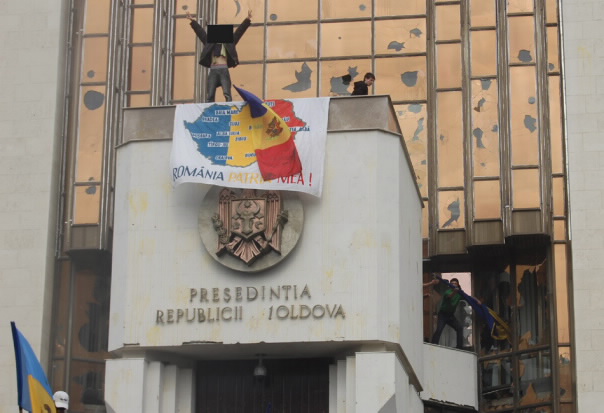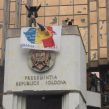
Moldova Tense After Post-Election Violence in Chisinau
Publication: Eurasia Daily Monitor Volume: 6 Issue: 68
By:

Opposition protests against the outcome of Moldova’s parliamentary elections triggered the seizure and ransacking of the presidency and parliament buildings by young rioting crowds on April 7 (EDM, April 7). Some 2,530 observers from local NGOs and 620 international observers monitored the elections. The International Election Observation Mission -consisting of delegations from the OSCE’s Parliamentary Assembly (OSCE PA), OSCE’s Office of Democratic Institutions and Human Rights (ODIHR), Council of Europe’s Parliamentary Assembly (PACE), and the European Parliament- has assessed the elections positively on the whole, with some reservations not affecting the outcome or the overall positive evaluation. The delegations’ leaders gave the following assessments at the post-election news conference (OSCE press release, April 6):
Petros Efthymiou, OSCE Greek Chairmanship-appointed head of the OSCE PA’s observer delegation and coordinator of OSCE short-term observers: "These elections were very good and gave me great confidence in the future of this country."
David Wilshire (British Tory), head of the PACE observer delegation: "a relaxed, mainly well-run and democratic polling day. Now the new parliament needs to make the necessary improvements to Moldova’s legal framework and electoral code."
Marianne Mikko (Estonian Social-Democrat member of the European Parliament, chairing the EP-Moldova commission), head of the European Parliament’s observer delegation: "We noted real improvements in comparison with the 2005 parliamentary elections. However, further efforts must be made, in particular with regard to the position of the public broadcasting organization."
Nikolai Vulchanov (Bulgaria), head of the OSCE ODIHR’s long-term observation mission: "Our overall assessment is positive, but there is a need to inject more trust in the electoral environment, including through unbiased news reporting by the public broadcaster, improving voter registration procedures, and ensuring that contestants are treated equally by the authorities."
In the International Mission’s collective assessment, these elections "offer[ed] voters distinct political alternatives. The legal framework generally provided an adequate basis for the conduct of a democratic election, although important previous recommendations remain to be addressed. Election day was well organized and passed calmly and peacefully, the voting and counting process was assessed positively by the observers, despite a number of significant procedural shortcomings. The media provided contestants with opportunities to convey their message in particularly thorough debates and paid airtime. The state broadcaster [however] blurred the distinction between the coverage of duties of state officials and their campaign activities" (Statement of Preliminary Findings and Conclusions, press release, April 6).
This general assessment will be followed, according to established practice, within some weeks or a few months by a detailed technical assessment from the OSCE’s ODIHR, with recommendations for further improvements in the electoral process. Meanwhile Mikko commented for Estonian radio that, whether one likes the Communist Party or not, this is the "legally elected party" and "this was the desire of the Moldovan people" (Infotag, April 7).
Opposition leaders as well as the uncontrolled rioters seem to ignore these international assessments. The opposition had similarly demanded in 2005 the cancellation of elections, even after the International Observation Mission had assessed those elections positively on the whole. The present cast of opposition leaders is mostly different from that of four years ago, with the notable exception of Our Moldova leader Serafim Urecheanu, whose group had banked on Moscow’s support at that time.
President Vladimir Voronin (whose second, final term of office is expiring) and the outgoing parliament’s chairman, Marian Lupu, stated on television that any complaints about electoral fraud or the compilation of electoral lists must be referred to the territorial electoral commissions, accompanied by evidence. Under the law, the Central Electoral Commission has until April 10 to announce the final results, based on tabulation from the local commissions. Any contestations can then be filed with the courts. Opposition leaders have not presented any evidence of fraud thus far. Instead, they now voice suspicion that the electoral commissions had tampered with the voter registration, in ways presumed to have favored the Communist Party well ahead of the elections. Opposition party representatives, however, had sat on all electoral commissions during the pre-election period. The Central Electoral Commission has announced that it would make the voter registration records available to the opposition parties for checking (Moldpres, Infotag, April 8).
Voronin is dividing the blame for the riots evenly between the local opposition and Romania. Addressing a large gathering government and non-governmental officials on television, Voronin has announced that the Romanian ambassador and the deputy chief of mission have been declared persona non grata. Moldova’s Ministry of Foreign Affairs is introducing entry visa requirements, in place of the visa-free entry which Romania’s citizens have thus far enjoyed in Moldova -visas will be issued gratis, as are Romanian entry visas for Moldova’s citizens (Moldpres, April 8).
Neither Voronin nor other Moldovan authorities have presented any evidence of Romanian involvement, however. Their Romania-bashing looks, as Romanian Senate Chairman Mircea Geoana has described it, "born of panic" (Rompres, April 8). With this exception, however, Moldovan authorities handled the violent rampage with calculated restraint after the initial shock. As Chisinau’s police chief, Iacob Gumenai, announced in the evening of August 7 -based on Voronin’s orders- and as the president said more elaborately the following day, the authorities decided "at all costs to avoid bloodshed."




